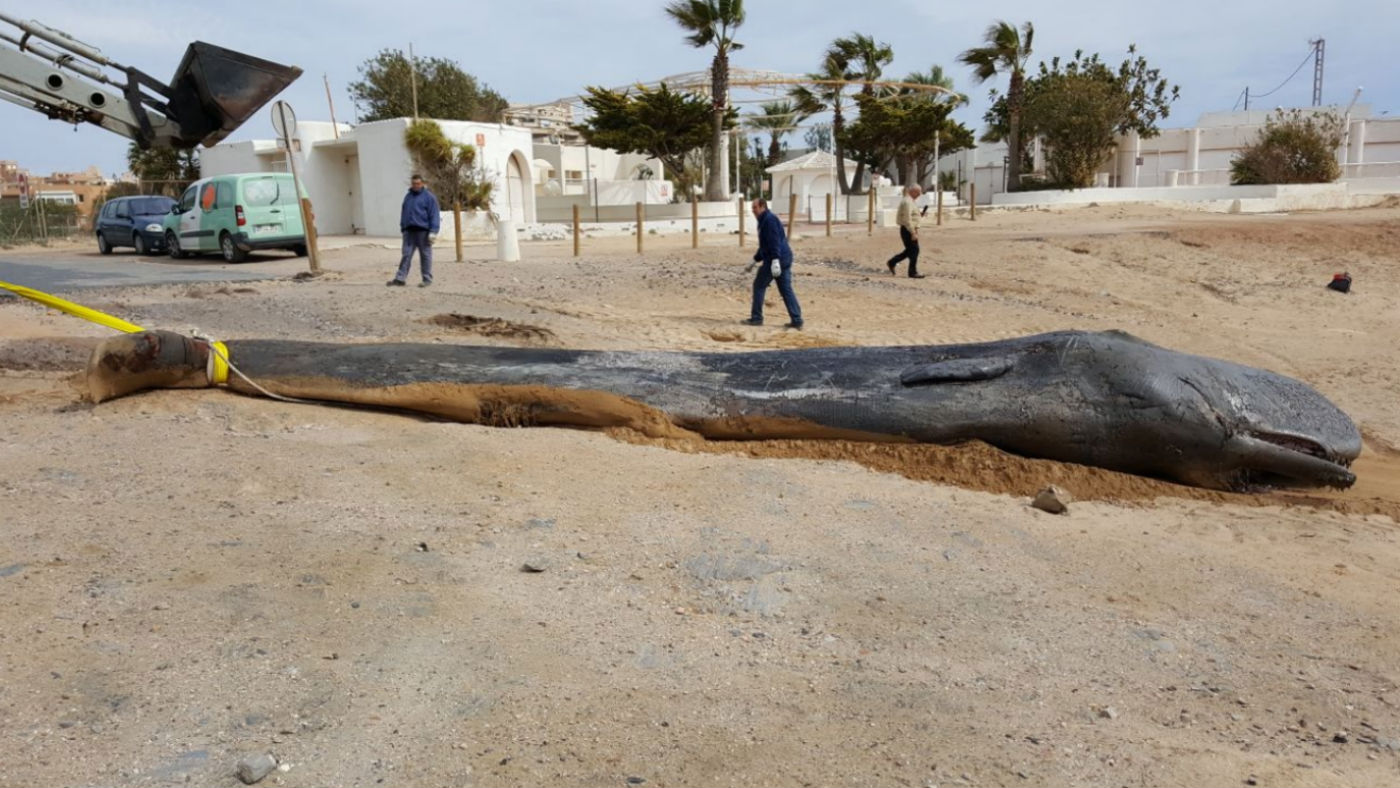Sperm whale ‘died after consuming 29kg of plastic waste’
Spanish politicians urge action on plastic litter in the world’s oceans

A free daily email with the biggest news stories of the day – and the best features from TheWeek.com
You are now subscribed
Your newsletter sign-up was successful
The government of the Spanish region of Murcia has launched an anti-pollution compaign after a dead sperm whale which washed up on one of its beaches was found to have ingested almost 30kg of rubbish.
Sperm whales subsist on a diet dominated by squid and other marine creatures. However, the 32ft-long juvenile found on Cabo de Palos in February had consumed “plastic bags, pieces of nets and ropes, raffia sacking and even a plastic drum”, The Local reports.
Experts from the nearby El Valle Wildlife Recovery Centre extracted 29kg (about four and a half stone) of manmade rubbish from its stomach.
The Week
Escape your echo chamber. Get the facts behind the news, plus analysis from multiple perspectives.

Sign up for The Week's Free Newsletters
From our morning news briefing to a weekly Good News Newsletter, get the best of The Week delivered directly to your inbox.
From our morning news briefing to a weekly Good News Newsletter, get the best of The Week delivered directly to your inbox.
“The whale would have been unable to digest or excrete the rubbish,” says the ABC. “It likely died of peritonitis, an inflammation of the tissue that lines the abdomen, which is usually caused by an infection or a hole in the intestines.”
The images of the items found in the autopsy have now been shared as local authorities launch a campaign to clear up Spain’s coastline.
Murcia’s ministry of tourism, culture and environment has pledged to begin a massive clean-up project along the coast, as well as a programme of talks and presentations to raise public awareness of the problem.
Consuelo Rosauro, the local government’s environment chief, said the death of the sperm whale was emblematic of a far broader problem of pollution in the world’s oceans.
A free daily email with the biggest news stories of the day – and the best features from TheWeek.com
"The presence of plastics in seas and oceans is one of the greatest threats to the conservation of wildlife throughout the world," he said.
Greenpeace UK estimates that 12.7 million tonnes of plastic end up in the ocean every year.
-
 Sepsis ‘breakthrough’: the world’s first targeted treatment?
Sepsis ‘breakthrough’: the world’s first targeted treatment?The Explainer New drug could reverse effects of sepsis, rather than trying to treat infection with antibiotics
-
 James Van Der Beek obituary: fresh-faced Dawson’s Creek star
James Van Der Beek obituary: fresh-faced Dawson’s Creek starIn The Spotlight Van Der Beek fronted one of the most successful teen dramas of the 90s – but his Dawson fame proved a double-edged sword
-
 Is Andrew’s arrest the end for the monarchy?
Is Andrew’s arrest the end for the monarchy?Today's Big Question The King has distanced the royal family from his disgraced brother but critics claim a ‘fit of revolutionary disgust’ could still wipe them out
-
 Epstein files topple law CEO, roil UK government
Epstein files topple law CEO, roil UK governmentSpeed Read Peter Mandelson, Britain’s former ambassador to the US, is caught up in the scandal
-
 Iran and US prepare to meet after skirmishes
Iran and US prepare to meet after skirmishesSpeed Read The incident comes amid heightened tensions in the Middle East
-
 Israel retrieves final hostage’s body from Gaza
Israel retrieves final hostage’s body from GazaSpeed Read The 24-year-old police officer was killed during the initial Hamas attack
-
 China’s Xi targets top general in growing purge
China’s Xi targets top general in growing purgeSpeed Read Zhang Youxia is being investigated over ‘grave violations’ of the law
-
 Panama and Canada are negotiating over a crucial copper mine
Panama and Canada are negotiating over a crucial copper mineIn the Spotlight Panama is set to make a final decision on the mine this summer
-
 Why Greenland’s natural resources are nearly impossible to mine
Why Greenland’s natural resources are nearly impossible to mineThe Explainer The country’s natural landscape makes the task extremely difficult
-
 Iran cuts internet as protests escalate
Iran cuts internet as protests escalateSpeed Reada Government buildings across the country have been set on fire
-
 US nabs ‘shadow’ tanker claimed by Russia
US nabs ‘shadow’ tanker claimed by RussiaSpeed Read The ship was one of two vessels seized by the US military